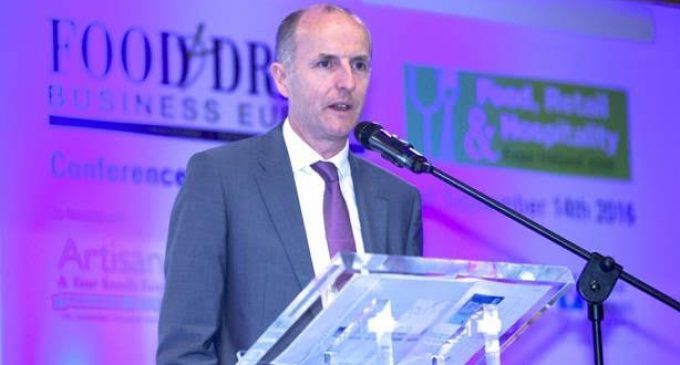Weakness in Sterling Could Cost Over €700 Million in Irish Food Exports and About 7,500 Jobs

“If the Irish food sector starts to sneeze, the overall economy will catch a cold,” according to Paul Kelly (pictured right), Director of Food and Drink Industry Ireland (FDII), a business sector within Ibec, the group that represents Irish business both domestically and internationally.
He was speaking on the challenges facing the Irish food and drink sector in the wake of Brexit at the recent Food & Drink Business Conference and Exhibition, held at the Citywest Convention Centre in Dublin. “Ireland is by far the most impacted country and food and drink is by far the most impacted sector,” he said.
Although the Irish food and drink industry has been successfully expanding and diversifying its export markets to reduce over-reliance on the UK, Brexit has left it very exposed. The UK is still the Republic of Ireland’s largest single market, accounting for sales of Eur4.4 billion in 2015, equivalent to 41% of total Irish food and drink exports. Some 70% of Irish consumer food exports, 56% of meat exports and 30% of dairy exports are destined for the UK.
“We are the most exposed sector as the UK is our largest trading partner. The food and drink sector is the more worried than other sectors, even though better prepared.” Paul Kelly added: “This reflects the exposure the sector feels and this will impact on the wider economy.”
Structural Change
The Irish food and drink sector has coped with major trading fluctuations in the past such as in 2009 when it lost a significant amount of UK market share as a result of a currency shift. Brexit is very different, he stressed. “Brexit is causing a structural change rather than a cyclical change in Sterling.”
 An FDII review of the historical exchange rate and the agri-food export relationship shows that a 1% weakness in Sterling results in a 0.7% drop in Irish exports to the UK. “If Sterling was to weaken towards the £0.90 mark, this would translate to losses of over Eur700 million in food exports and about 7,500 Irish jobs,” he pointed out.
An FDII review of the historical exchange rate and the agri-food export relationship shows that a 1% weakness in Sterling results in a 0.7% drop in Irish exports to the UK. “If Sterling was to weaken towards the £0.90 mark, this would translate to losses of over Eur700 million in food exports and about 7,500 Irish jobs,” he pointed out.
“Ireland is the preferred supplier at the moment for many food categories but the risk is that the UK will start to look elsewhere,” he said. With a weaker Sterling, UK food and drink exports would also become cheaper in international markets providing increased competition for Irish products both at home and abroad.
He elaborated: “We are a high cost country and we have now lost a further 15% of our competitiveness compared to our neighbour. The big issue for us is that there will be a loss of confidence in Ireland as a competitive supply base resulting in loss of markets and jobs.”
Immediate Response Needed
 “We need an immediate Brexit response from Government,” he remarked. “In addition to an immediate response to the currency shock, we need to work towards a positive outcome in formal exit negotiations. The main objective must be to maintain full unfettered access to the UK market for Irish exporters.”
“We need an immediate Brexit response from Government,” he remarked. “In addition to an immediate response to the currency shock, we need to work towards a positive outcome in formal exit negotiations. The main objective must be to maintain full unfettered access to the UK market for Irish exporters.”
In a recently published report into the implications of Brexit, FDII has made a number of recommendations.
* A review of the impact of Brexit on the objectives contained in the national agri-food strategy FoodWise 2025.
* A Government established taskforce led by the Department of the Taoiseach to engage with the food and drink sector on implementing immediate measures that will safeguard today’s business and trade flows in the face of this major challenge to our competitive position.
* The re-introduction of the Employment Subsidy Scheme and the Enterprise Stabilisation measures which were last applied in 2009-11.
* €25 million in funding for market diversification and product innovation measures.
* An access to finance package that includes sustainable financing via funding from the Irish Strategic Investment Fund and improved State Aid rules.
* An intense on-going focus on cost competitiveness led by a Department of Jobs, Enterprise and Innovation in areas such as labour, energy and insurance.
* A fully ‘Brexit-proofed’ Budget which will address tax competitiveness against the UK.


































